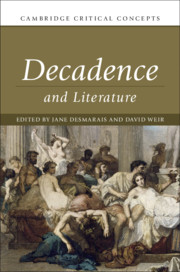Book contents
- Decadence and Literature
- Cambridge Critical Concepts
- Decadence and Literature
- Copyright page
- Dedication
- Contents
- Figures
- Contributors
- Acknowledgements
- Introduction
- Part I Origins
- Part II Developments
- Chapter 8 Decadence and the Visual Arts
- Chapter 9 Decadence and Music
- Chapter 10 Decadence, Parody, and New Women’s Writing
- Chapter 11 The Philosophy of Decadence
- Chapter 12 The Sexual Psychology of Decadence
- Chapter 13 The Theology of Decadence
- Chapter 14 The Science of Decadence
- Chapter 15 The Sociology of Decadence
- Part III Applications
- Select Bibliography
- Index
- References
Chapter 14 - The Science of Decadence
from Part II - Developments
Published online by Cambridge University Press: 12 August 2019
- Decadence and Literature
- Cambridge Critical Concepts
- Decadence and Literature
- Copyright page
- Dedication
- Contents
- Figures
- Contributors
- Acknowledgements
- Introduction
- Part I Origins
- Part II Developments
- Chapter 8 Decadence and the Visual Arts
- Chapter 9 Decadence and Music
- Chapter 10 Decadence, Parody, and New Women’s Writing
- Chapter 11 The Philosophy of Decadence
- Chapter 12 The Sexual Psychology of Decadence
- Chapter 13 The Theology of Decadence
- Chapter 14 The Science of Decadence
- Chapter 15 The Sociology of Decadence
- Part III Applications
- Select Bibliography
- Index
- References
Summary
In the nineteenth century, the concept of decadence was not solely of aesthetic interest but had a number of scientific applications. Decadence itself is an organic metaphor, extending the natural processes of decline and decay to societies and the arts. Rather than rejecting nature outright, decadent authors readily embraced new scientific theories that changed the way people thought about the natural world. The pessimism of nineteenth-century science stemmed from the brutal world of industrial capitalism in which it was developed. Decadent writers then incorporated both scientific ideas and language into a literary style obsessed with decay and decline. Finally, science returned to decadent literature to pathologize certain modes of artistic expression as yet another sign that certain types of individuals were ‘degenerate’. Three key scientific theories of the nineteenth century underpin the decadent fixation on decline, decay, and degeneration: uniformitarianism, evolution, and the conservation of energy. All three theories identify impermanence in natural structures previously believed to be permanent and stable.
- Type
- Chapter
- Information
- Decadence and Literature , pp. 232 - 247Publisher: Cambridge University PressPrint publication year: 2019
References
- 2
- Cited by



